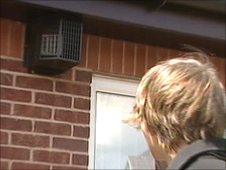Stafford teenager fighting for mosquito device ban
- Published

Oli says the decision means the issue is being taken seriously
News that the Council of Europe has called for a ban on all acoustic devices aimed at dispersing youths loitering outside shops or village halls will be music to the ears of teenagers.
The most well-known device is the mosquito, which is a small box that emits a high-pitched sound said to be only audible to young people, usually under the age of 25.
Councils, supermarkets and police have been using them in anti-social behaviour hot-spots around the UK with some 3,500 brought into use since about 2005.
But one teenager in particular will be pleased with the council's decision.
Oli Phillips, a 17-year-old from Stafford, is a member of the Youth Parliament for the West Midlands region who has been campaigning for more than a year to get the controversial devices banned through his Bite Back project.
He is not alone. A national campaign called Buzz Off kicked off two years ago.
'Taken seriously'
Backed by the Children's Commissioner for England, the National Youth Agency and Liberty, the groups are all calling for them to be banned.
They say that even if the devices do not damage a person's hearing, they are an unfair attack on young people's human rights.
Oli estimates there are about 350 in the West Midlands region.
He said: "I am opposed to the devices because they discriminate against young people.
"If this was a device that was directed at an ethnic minority the public would be outraged."
The devices are effective because a person's ability to hear high frequencies generally declines once they reach their 20s, meaning that the sounds emitted are not detected by most adults.
Standing by a device, Oli said the sound they emit is painful, similar to scratching on a school blackboard.
"It's like that sort of noise, except at a higher frequency and it's hurting my ears just standing here," he said.
On Friday, the Parliamentary Assembly of the Council of Europe (PACE) unanimously recommended a ban on "all acoustic devices which discriminate against young people, such as the mosquito".
Marketing or selling them for private use should also be prohibited or at least their use on private premises should be accompanied by clear warnings, representatives said.
The council, made up of 47 countries and based in Strasbourg, said it "debates policies for adoption which are submitted to governments for action".
Oli said their decision was an important step for his campaign.
He said: "I think that... the backing of the Council of Europe is fantastic.
"It shows that this issue is being taken seriously."
He met representatives of the previous Labour government as part of his Bite Back campaign.
But in 2008, government officials said there were no plans to ban the use of mosquito devices but stressed they should be "a last resort" against anti-social behaviour.
But the current government does not sound like it is listening to calls for a ban.
Reacting to the Council of Europe's decision, Police Minister Nick Herbert said in the House of Commons: "In relation to the Council of Europe report and the issue of guidance, our stance is that we do not see this as an issue on which we should intervene."

Oli says the sound is like scratching on a blackboard
A Home Office spokesman told BBC News that it was up to local agencies dealing with anti-social behaviour to decide whether to use them or not.
"The UK Health and Safety Executive has concluded that, whilst some short-term effects on hearing are possible through prolonged exposure, there is no evidence of any long-term ill-effects," a spokesman said.
The Association of Convenience Stores, which represents 33,500 local shops in the UK, has always backed their use but a spokesman said he accepted that perhaps a better long-term solution was for retailers to engage with young people through community support officers.
"In certain situations they have been a real benefit where there are gangs of young people causing problems but we say they should only be used when there is a problem, he said.
"Gangs of young people can cause stress for shops owners and customers but getting to the root of the problem rather than moving the problem on is maybe a better long-term answer."
But following the council's announcement, Oli said he now plans to lobby Home Secretary Theresa May.
With several organisations also in favour of getting them removed, he said he felt he was not alone.
Maggie Atkinson, Children's Commissioner for England, welcomed the council's stance. She said it was a "positive step towards preventing discriminatory practices being used against our children and young people".
"The mosquito does not prevent anti-social behaviour, it just moves the problem down the road," she added.